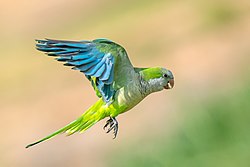This gem of a book -- by Fred Pearce, ISBN 978-1-84831-834-2 -- is absolutely the most Erisian read of the year (thus far -- I mean it's only May).
Take a gander.
>> The book is FULL of Erisianic phraseology. He cites a book by David Botkin, for instance, called Discordant Harmonies. Elsewhere he says "Disturbance is essential" (pg. 190); "most change is random" (pg. 191); and "trying to maintain stability creates instability" (pg. 193). On and on throughout the book. But then he somehow MISSES HIS OWN POINT as he continues.
>> The book argues with all those who argue -- pretty fiercely -- against any sort of species being introduced anywhere. What could be more Discordian than that!?
>> He backs up his arguments against their arguments by giving LOADS OF EXAMPLES of how introduced species have mostly proven harmless to local ecosystems. A really fine example he didn't mention was the Monk parakeet, which escaped from captivity in the US (among other places) in the 1950s and have since established themselves in places like the greater Chicago area. They are noisy and their nests are hideous, resembling nothing so much as giant hornets' nests wrapped around electrical poles. But they have NOT, as predicted, ended American civilization as we know it.
>> He also failed to bring up the walking catfish, the sea lamprey or the ubiquitous goldfish -- which lives around the world now -- although he did mention the Northern snakehead and the dreaded Asian carp. He didn't go into it very deeply, but only pointed out that there is no proof they are laying waste our waterways, or really causing any other trouble. He slyly points out the parallel between fearing foreign plants and animals and fearing human foreigners, which I find both highly perceptive and VERY important to understanding species prejudice.
>> He points out how in most cases, introduced species have DIED OUT because they couldn't hack it in a new setting. Again, I wish he had offered more examples, but I suspect nobody keeps track of that very well.
>> One he DID mention was the great and terrible Cane Toad, or Bufo marinus, introduced decades ago in Australia to control an introduced insect, which was eating the introduced sugar cane farmers were trying to grow. It was a GLORIOUS DISASTER, which you can learn about by watching this boffo documentary:

We all came away from that movie with the impression that Australia was DOOMED. But Pearce, in his book, made clear that Australian natives are ADAPTING to the invasion, pretty well in fact. The local crocs, for instance, have learned to bite the legs off the toads rather than swallowing them whole, so they can eat them without being poisoned. Other animals have adapted in other ways. Australia as a whole is STILL RIGHT THERE and happily, so are the quolls who were supposedly facing extinction because of the toads. He points out that other places in the world with other introduced species are ALSO adapting, usually pretty well. Scientific dogma (which ought to be an oxymoron, but it isn't) holds that invasive species take you in a STRAIGHT LINE from peace and plenty to ecological meltdown. But Pearce has found that isn't true.
>> And wait until you read what he says about the great and terrible Japanese Knotweed! I won't spoil it for you.
>> Curiously, this argumentative man DOESN'T QUESTION certain scientific assumptions even as he knocks a lot of the others down. He assumes, for instance, that the phrase "nature in balance" -- always the goal for those who want to keep invasives out of their backyards -- equals "nature in stasis." He scoffs at the very idea of nature being in balance. Dude. Balancing nature means CONSTANT CHANGE, CONSTANT ADJUSTMENTS. Pearce even says that this is normal in nature, but he never acknowledges that this IS balance, not the OPPOSITE of balance. I don't know sometimes, I really don't.
>> Pearce also fails to notice that he treats humans as being somehow OUTSIDE of nature, the usual mistake of human science. On page 151 I read where he points out that in spite of the pearl-clutching about biological diversity in New Zealand, only a few species have died out there, notably the Moa and the enormous eagles that once hunted them. "But both these birds died out about 600 years ago, as a result of hunting by the Maori people rather than species introductions," says the author. HE SEEMS NOT TO SEE THAT HUMANS ARE AN INTRODUCED SPECIES IN NEW ZEALAND. Dude. Look in the mirror!
Anyway, this is a great read and I came away from it GREATLY REASSURED.














